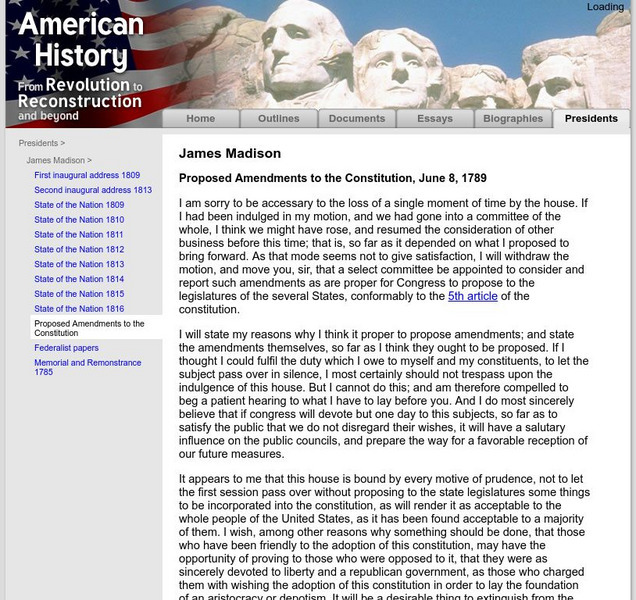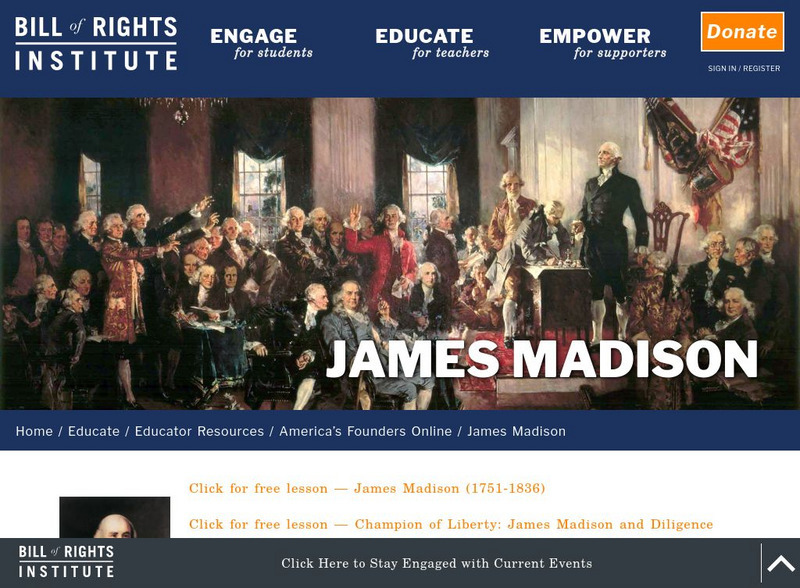Hi, what do you want to do?
Curated OER
The Bill of Rights
Students practice their reading comprehension skills by reading about the Bill of Rights. They answer questions after reading to test their comprehension.
Curated OER
What is the (No) Establishment Clause?
High schoolers research and discuss the Establishment Clause.
Music Publishers Association of the United States
I Made It. I Own It. Please Don't Steal It.
Explore the world of copyright law with a variety of activities to instill the importance of respecting creative property. Scholars watch an animated tale then take part in a grand conversation detailing the video's main idea, details,...
Curated OER
A Lesson To Accompany "The First Bank of the United States: A Chapter in the History of Central Banking"
Here is an interesting topic. Learners examine the economics that led to the founding of the First Bank of America. They participate in a reader's theater experience depicting the debate between Alexander Hamilton and Thomas Jefferson...
Bill of Rights Institute
The Declaration of Independence
Take classes on an in-depth tour of the Declaration of Independence. An informative resource effectively scaffolds learning by providing warm-up and wrap-up activities. It also includes a variety of handouts for individuals to complete,...
Judicial Learning Center
State Courts vs. Federal Courts
Popular culture often portrays the Feds as the most fearsome of law enforcement agencies. Yet, someone charged with a crime is considerably more likely to end up in a state court. The lesson, one of six covering the Organization of the...
Curated OER
The Federalist Papers
What were The Federalist Papers? If you're preparing your class for a quiz on this topic, consider providing them with these thought-provoking study questions. Ten questions are provided, although only three contain possible answers.
Curated OER
The First American Party System: Events, Issues, and Positions
Students identify factors which lead to the development of the Federalists and Democratic-Republicans. They examine the writings of Thomas Jefferson and Alexander Hamilton as well. They discuss what elements are needed for an orgainized...
Curated OER
The Two-Party System in American History: Ch 5
Five matching and 5 multiple choice questions to challenge your class. Their answers will test their knowledge of early American government. Party systems, Electorate, and major constituents of the time are the topics included.
Curated OER
Vocab-u-lous! Build a Fabulous Vocab
In this vocabulary worksheet, students select the best word choice to complete the sentence. All words correspond to the theme of Presidents' Day.
Curated OER
The New Republic
Students research the Federalists and Anti-federalists. In the lesson plan on state legislature, students use primary sources to create a brochure and write an essay that illustrates federalist and anti-federalists viewpoints.
Curated OER
The Federalist Debates: Balancing Power Between State and Federal Governments
Middle schoolers explain the basic positions of the Federalists and the Anti-Federalists. They chart the differences and similarities between state and federal governments. They write a persuasive essay in response to an open-ended...
Curated OER
The Three Branches of Government
Sixth graders discover details about the 3 branches of government. In this primary source analysis lesson, 6th graders examine documents and images from the Library of Congress to investigate the structure of the U.S. government.
Curated OER
Alexander Hamilton
In this online interactive history worksheet, learners respond to 10 short answer questions about the accomplishments of Alexander Hamilton. Students may check some of their answers on the interactive worksheet.
Curated OER
Legislative Branch (Congress) Questions
In this U. S. government worksheet, students respond to 10 short answer questions about the responsibilities of congressional members.
Curated OER
The Glorious Revolution, the American Revolution, and the French Revolution
Students relate the Glorious Revolution, the American Revolution, and the French Revolution through web based research and scenarios.
Curated OER
American Revolution Worksheet
In this American Revolution worksheet, students complete a nine multiple choice question quiz based on facts of the Revolutionary War.
Library of Congress
Loc: The James Madison Papers
A collection of letters, personal notes, and correspondences by James Madison. The documents date from 1723 to 1836 and describe the life as the man came to be known as the "Father of the Constitution",
University of Groningen
American History: Presidents: James Madison
Included are James Madison's two inaugural addresses, his State of the Nation speeches, as well as other writings related to the Constitution. Of particular interest is his speech of 1812.
Center For Civic Education
Center for Civic Education: James Madison and Executive Power
This lesson examines the legacy of the "philosopher statesman," James Madison. Madison combined the intellectual knowledge and creativity of the scholar with the practical savvy of the politician, a man of strong principles who also...
University of Virginia
University of Virginia Press: The Papers of James Madison
The papers of James Madison, plus a short biography, bibliography, and links to other sites. Site is detailed and comprehensive.
University of Groningen
American History: Presidents: James Madison: Proposed Amendments to Constitution
Text of James Madison's "Proposed Amendments to the Constitution," June 8, 1789. Madison states his reasons for the amendments in view of the anti-federalist feelings in many of the colonies. The proposal explains in Madison's own words...
Bill of Rights Institute
Bill of Rights Institute: James Madison
James Madison's slight stature and reserved personality gave little indication of his keen intellect and shrewd nature. No other Founder had as much influence in crafting, ratifying, and interpreting the United States Constitution and...
The White House
The White House: Presidents: James Madison
The official White House biography of James Madison, the father of the constitution.




























